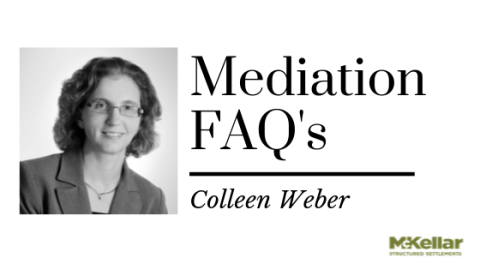
For this month’s blog, we spent some time talking to Colleen Weber, Principal here at McKellar Structured Settlements. Colleen works primarily in structured settlement consultation and attends numerous mediations, settlement meetings and plaintiff meetings. For this article, we asked her to provide us with some critical insight and information as to what people might expect when it comes to mediations and settlement meetings.
Q: When you’re asked to attend these meetings, what’s one of the first things you do?
A: I always ask the party that invited me to let the other parties know that I will be there. It’s really a professional courtesy, so that others won’t be surprised or perhaps feel intimidated by my presence. And, from what I can tell, it’s a gesture that seems to be appreciated around the table as I am often told that I was seen to be a valuable resource during the course of a meeting or negotiation.
Q: At a mediation or settlement meeting, what’s your typical role?
A: I’m able to provide quotes and structure information to any or all of the parties involved in the settlement discussions. And since there could be more than one party present, I see myself as being a neutral resource – someone who’s available to provide assistance to anyone who asks.
Q: Wouldn’t there be confidentiality issues with this?
A: Actually, no, there aren’t. I’ve always felt it to be totally appropriate to provide quotes for all parties while retaining strict confidentiality for each of them. It is then up to each party to decide how much – or how little – of this information they wish to share.
Q: When you’re at these meetings, why is it important to talk to people about structured settlements?
A: Whenever possible, I like to spend time with the injured party so that I can tell them about structured settlements, what they are and how they can be beneficial for them. While I’m there, I can also review illustrative examples in more detail with them so they get a better understanding of how a structured settlement works.
Q: Why is this so important for you?
A: Having these conversations with plaintiffs helps ensure that they understand not only the settlement structure and associated benefits but, more importantly, how a particular offer might meet their future needs. This then gives them an opportunity to ensure that any ensuing negotiations take this into account.
Q: Can you give us an example of how you might break down an offer to make it easier for someone to understand?
A: Sure. Say a plaintiff is told that an offer will generate a net payment of $875,000. This gives him or her information but it doesn’t offer any real additional context. So I break it down for them by saying that the amount will generate $100,000 in up-front cash and a further $2,000 per month ($24,000 per year) for life.
Q: What’s your reason behind providing this breakdown?
A: It’s really about giving something that is far more meaningful and helpful to people so they are able to take this information and make sense of it, see how it can fit in with their lives going forward.
Q: In your role as a structured settlement consultant, you’re able to fulfill dual responsibilities, right?
A: Absolutely. At a meeting or negotiation I am able to provide on-site annuity costings of future financial requirements in addition to being able to translate offers into meaningful future payment streams.
Q: What are some of the other duties that you’re able to provide?
A: If I’m present towards the end of the meeting, I can ensure that the Minutes of Settlement contain the necessary structure details. I can also deal with any questions that might arise in cases where there is a structure.
Q: What kinds of questions might come up?
A: For example, whether the paying insurer will own the structure or assign it or who will be responsible for the assignment fee. Another question might be if the structure includes a reversion and so on. Getting all of these details sorted out up front really helps avoid disputes and delays later on.
Q: One last question: what are the costs associated with retaining your services?
A: There is no cost attached to this for any of the parties. I am a resource that’s available for all of them. If the case settles with a structure, I receive a commission from whichever life insurance company is used. Otherwise, my services are free.
ABOUT COLLEEN A. WEBER
Ms. Weber has been with McKellar Structured Settlements for over 25 years and has been Principal since 2003. To learn more about Colleen, check out her bio here, or contact her directly here.